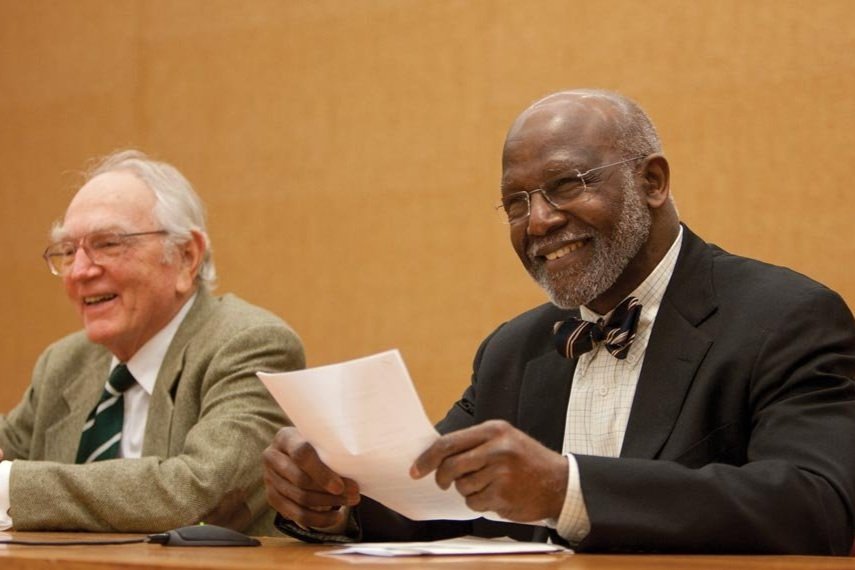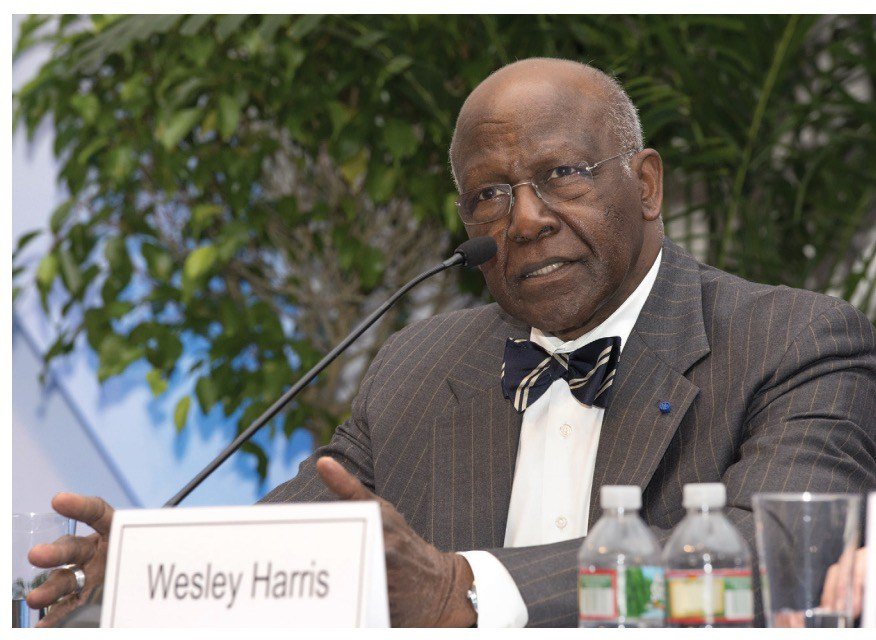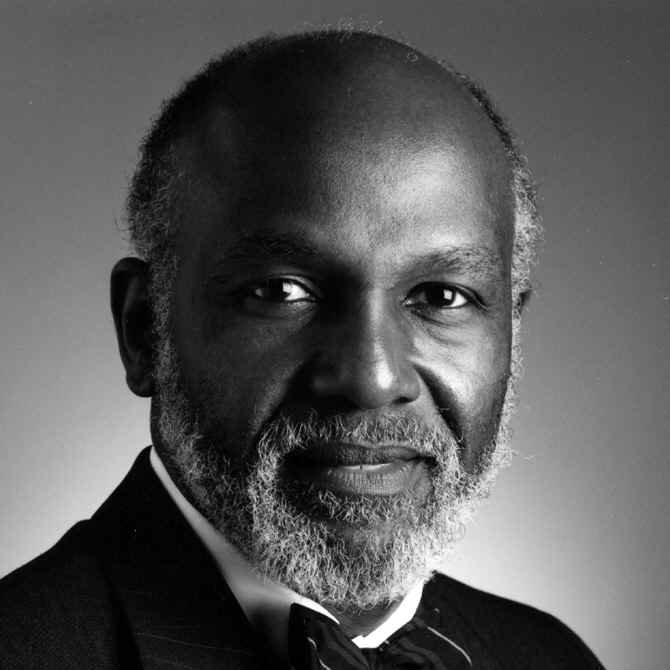
School of Engineering
Wesley Harris
Wesley Harris
Harris was not even thinking about going to the University of Virginia. Until his physics teacher, Eloise Bowles Washington, at Armstrong High School, in Richmond pulled him aside and demanded that he should. “I was a black person, who was obviously black in appearance and I was extremely bright and would be successful at UVA,” Harris recalled her telling him. He took her advice.
Harris had a unusual sense of what the University of Virginia was during that time, probably moreso than any of his other fellow black students did before attending. "I thought it was small, elitist, racist, and probably very overrated,” Harris simply said. With that in mind, he knew he would endure a great social isolation, but socializing was not Harris’ primary thought about attending the University. "My purpose of going to UVA was to excel as a black scholar,” said Harris frankly.
Upon entering the University, Harris decided to major in aeronautical engineering. His classroom experiences were mixed. Oftentimes he was ignored, by some he was welcomed. Some were in his words “straight out hard core racist” faculty members.He found a community in the black students that were already there. The small group of black men and we all got along very well together,”said Harris.
Like many black alumni from that period, Harris too hearkens back to the warmth of the black community in Charlottesville. “All social life that I experienced as an undergraduate was a result of members of Charlottesville black community to visit their homes and to visit their families”. However like the rest of the men during his time, academics was important. To Wesley Harris they were of the utmost primary importance. When he speaks of his time at the University, he speaks of it in terms of only academics and what he set down to achieve. And achieve he did.
Every semester he was on the Dean’s List. He was initiated into Tau Beta Pi, the Engineering Honor society. He was the first African American to be inducted into the much hallowed Jefferson Literary & Debating Society. His speech and critical analysis work, that every member must give to the Society, was on Kierkegaard and Existentialism. In an interview a few years earlier he said, “The Jefferson society was totally caught off guard, first of all that I was black, second that I was an engineer, and third that I was an engineer who knew something about…philosophy and literature”.
He became a member of the Thomas Jefferson Council on Human Relations in Virginia eventually moving up to the chairmanship. An interracial array of faculty and students, the committee was dedicated to addressing race issues at the University. Their hard work paid off, in inviting Dr. Martin Luther King Jr. to come speak at the University in March of 1963. King spoke at Old Cabell Hall to 900 students. Harris was in charge of organizing the event. Harris, along with other black students and faculty, also picketed both a restaurant and a theater on the Corner that stubbornly refused to desegregate.
Watching the national events of the civil rights struggle unfold before his eyes, Harris used it to steady his purpose. “The national civil rights activities especially in the South was a motivating actor or enabler that sustained or provided me with extra incentive to achieve”, said Harris firmly. Harris’ activism and his stellar academic record, particularly his academic record earned him the envy of most his white classmates. The envy manifested itself through hatred. Tau Beta Pi, Jeff Society, AIAA student chapter were extremely envious of a black person who had a GPA significantly higher than theirs,” Harris said.
Harris was also one of the few students who balanced activism very well with his academics. He never was one to sit idly by and watch things happen. He became a member of the Thomas Jefferson Council on Human Relations in Virginia eventually moving up to the chairmanship. An interracial array of faculty and students, the committee was dedicated to addressing race issues at the University. Their hard work paid off, in inviting Dr. Martin Luther King Jr. to come speak at the University in March of 1963. King spoke at Old Cabell Hall to 900 students. Harris was in charge of organizing the event. Harris, along with other black students and faculty, also picketed both a restaurant and a theater on the Corner that stubbornly refused to desegregate.
Watching the national events of the civil rights struggle unfold before his eyes, Harris used it to steady his purpose. “The national civil rights activities especially in the South was a motivating actor or enabler that sustained or provided me with extra incentive to achieve”, said Harris firmly. Harris’ activism and his stellar academic record, particularly his academic record earned him the envy of most his white classmates. The envy manifested itself through hatred. Tau Beta Pi, Jeff Society, AIAA student chapter were extremely envious of a black person who had a GPA significantly higher than theirs,” Harris said.
His accomplishments made him high profile and as a result took a substantial amount of abuse. He endured being a spit on and having lit cigarettes thrown at him. He lived alone for four years because whenever a white student realized they had to room with him, they would promptly move out. “It was a time that racism was in fashion,” remarked Harris, “there was no way to misinterpret Wes Harris as being anything other than a black person.” Toward the end of his academic career, despite his hardships he got to break even further ground when he was the first of to be inducted into the new Engineering Honors program. Harris was also selected to live on the Lawn in 1964. Even though popular UVA folklore says that Wes Harris is the first, he maintains he is the second, not too far behind the first black student to live on the Lawn, Leroy Willis, who did in 1961-62.
When he looks back on his years at the University, he does not believe himself to be a pioneer in the slightest. “All of the black students at UVA in the fifties and sixties are historical figures, good or bad, that is simply the way it is. That is a fact. We were there at a difficult time. We were there as pioneers or whatever,” said Harris.
In retrospect, Harris looks at his University career as the accomplishment of a challenge his teacher at Armstrong High School, Eloise Bowles Washington gave him many years ago. “I was a student who was committed to execute according to instructions given to me by physics high school teacher. To achieve academically, to achieve academically, to achieve academically,”said Harris firmly.
Although some black alumni mention some of their goals then was to show white faculty and students what in fact they could do at the University, Harris was intent on showing black people what they could do. “To convince black folks, not white folks, but blacks folks, that in a hostile environment they could achieve academically,”he said. “And to the highest level not just messing around getting a “D” or “C” or getting out of the place, laughing and shucking and joking. But to achieve, to be a senior stellar scholar”.
After his graduation, Harris headed to Princeton to pursue his doctorate in chemical engineering. He came back and was an assistant professor in engineering for a short time at the University. He left never to return, except on the rare occasion of speaking at occasional academic lunches and dinners.
Harris' talents took him far besides his doctorate at Princeton, and his minor teaching post at the University. Harris also taught at the Massachusetts Institute of Technology (MIT), was dean at the University of Connecticut 1985-90, was vice president at the University of Texas and spent 2 ½ years before returning to MIT, where he still teaches. He is also currently a member of the National Academy of Engineers.
Though Harris is affiliated with the Black Alumni group through the Alumni Association, he does not return for events. However, he is friendly with those black alumni that were present during his time at the University. His experience beyond academics at UVA, Harris only says, “I don’t think your generation could imagine a University of 12,000 students, 32 white fraternities, no black women, no white women either, and racism amongst faculty members in the classroom, making jokes about black people. I don’t think you can imagine that”
Harris may have disgusted and angered many whites with his academic achievement during his time at UVA. But he awed his fellow black classmates and inspired in them even further a sense of what they could do.
Although Wesley Harris never returned to the University, his twin brother who had attended Howard University while Wesley attended UVA, came to UVA. William Harris became the first Dean of the Office of African American Affairs in 1976 when the office opened. William Harris taught architecture at the Architecture School at UVA for a time before leaving.
Sources:
http://xroads.virginia.edu/~ug03/omara-alwala/Harrison/WesHarris.html
https://www.thehistorymakers.org/biography/wesley-harris
https://viastory.org/hall-fame/wesley-l-harris-srnbsp
https://nontrivialproblems.wordpress.com/2018/05/17/the-work-of-dr-wesley-harris/
https://www.blackpast.org/african-american-history/people-african-american-history/dr-wesley-leroy-harris-1941/




